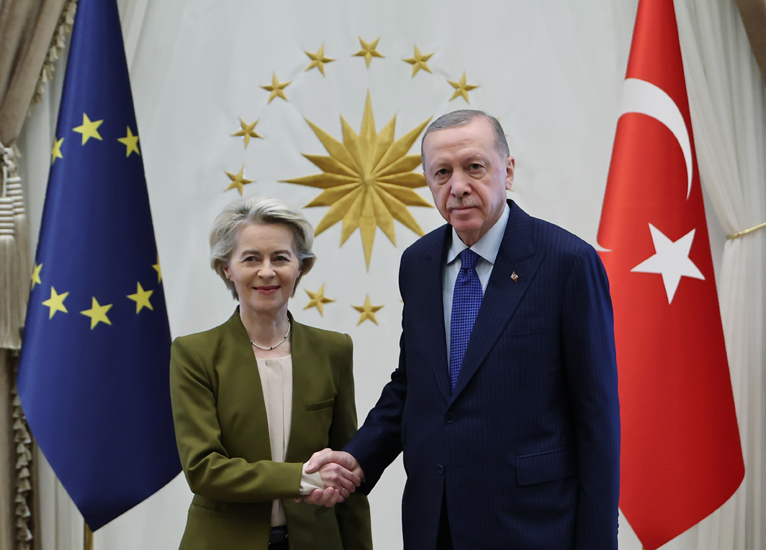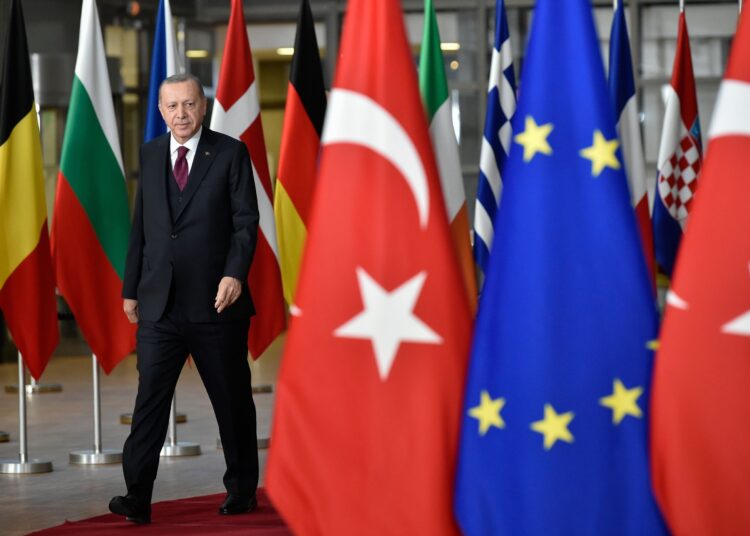Levent Kenez/Stockholm
A new report from the European Parliament (EP) has sharply criticized Turkey’s foreign policy under President Recep Tayyip Erdogan, calling it increasingly confrontational, inconsistent with EU values and damaging to the long-stalled accession process.
The report, prepared by European Parliament Turkey rapporteur Nacho Sánchez Amor, evaluates the state of EU-Turkey relations over the past two years. It presents a stark assessment of Ankara’s international posture, describing a foreign policy course that regularly contradicts the EU’s priorities and warns that Turkey’s actions are more frequently creating friction than fostering cooperation with the bloc.
The report details a wide array of Turkey’s international activities, from its military operations in neighboring regions to its growing strategic autonomy, and frames them as indicative of Ankara’s drift away from EU political standards and principles.
At the heart of the report lies a troubling paradox. Turkey remains a candidate country for EU membership but behaves increasingly like a geopolitical rival. According to the report, Turkey continues to conduct a foreign policy that is largely unaligned with the European Union’s Common Foreign and Security Policy (CFSP), and Ankara’s rate of alignment with CFSP declarations and decisions has remained persistently low in recent years.
In 2023, for example, Turkey aligned with only a small portion of EU foreign policy positions. The parliament deeply regrets Ankara’s refusal to follow EU sanctions on Russia following its invasion of Ukraine. This decision placed Turkey in direct opposition to the bloc’s unified stance against Kremlin aggression.
Moreover, the report expresses alarm over Turkey’s continued military presence in Syria and Iraq, its ongoing confrontation with Kurdish groups and Ankara’s assertive role in conflicts like Libya and Nagorno-Karabakh. Members of the European Parliament concluded that these actions undermine regional stability and conflict with the EU’s diplomatic efforts.
The document also flags Turkey’s rocky relations with NATO and EU member Greece and EU member Cyprus. Particularly troubling to EU lawmakers are continued overflights of Greek territory and naval drills in the disputed waters of the eastern Mediterranean. The report urges Turkey to respect international law and condemns repeated violations of Greek airspace.

Turkey’s refusal to recognize the Republic of Cyprus remains a longstanding grievance. The MEPs deplore Ankara’s ongoing support for the self-declared Turkish Republic of Northern Cyprus (KKTC) and its unilateral actions in Varosha, the abandoned resort city whose partial reopening inflamed tensions.
The parliament calls on Turkey to engage in a meaningful dialogue aimed at a comprehensive settlement of the Cyprus issue, based on UN resolutions and EU values. However, this prospect appears increasingly unlikely given recent developments on the ground.
Turkey’s unique geopolitical position, straddling East and West, is again emphasized in the report, particularly regarding the war in Ukraine. While praising Ankara’s role in brokering the Black Sea grain deal, the MEPs are deeply critical of Turkey’s continued economic cooperation with Moscow.
The report suggests Turkey has become a critical backdoor for Russia to evade EU sanctions, especially in sectors like finance and energy. According to the lawmakers, this undermines EU unity and weakens the effectiveness of the joint response to Russian aggression.
Meanwhile, Turkey’s delayed ratification of Sweden’s NATO membership also drew criticism. Although the issue was eventually resolved, it left a diplomatic scar. The parliament labeled Ankara’s tactic as unhelpful and motivated more by bilateral bargaining than collective security.
One of the more alarming points in the report is what it describes as Turkey’s transactional approach to international relations. Rather than adhering to stable principles, Ankara is accused of leveraging bilateral disputes for strategic concessions.
Examples include the use of the refugee crisis to pressure the EU and conditional stances in NATO or arms negotiations, including recent F-16 fighter jet discussions with the United States. The report urges Turkey to move away from zero-sum diplomacy and to act as a predictable and principled partner rather than a disruptive actor.
While the report contains blistering critiques, it also reflects a deeper strategic concern. The near-total breakdown of Turkey’s EU accession process remains central. The MEPs lament the continuous backsliding on the rule of law and fundamental freedoms in Turkey, which has effectively halted any progress toward EU membership.
The parliament reiterates its 2023 call to reconsider the framework of EU-Turkey relations, possibly replacing the accession perspective with a mutually appealing and realistic partnership. However, it emphasizes that this shift should not reward autocratic behavior or diminish the EU’s commitment to democratic values.
The report clearly states that the accession process cannot proceed under the current circumstances, but neither should the EU close the door entirely, especially to Turkish civil society and pro-European forces.
In its conclusion, the report walks a delicate line. It warns of Turkey’s increasingly adversarial posture while still calling for channels of cooperation in areas of shared interest such as migration, energy and trade.
Human rights groups and opposition circles in Turkey criticize the European Union for making statements or publishing reports against Turkey without taking concrete action, arguing that the EU turns a blind eye to human rights violations by President Erdogan’s government in exchange for Turkey’s preventing migrants, particularly Syrians, from reaching EU borders.
Ankara traditionally dismisses European Parliament reports as biased. In response to a previous report, the Turkish Ministry of Foreign Affairs accused the EP of relying on disinformation from anti-Turkey circles and described the report as unfair and prejudiced. The ministry also claimed the document reflected what it called the parliament’s short-sighted and populist stance, arguing that EP members lack the strategic vision needed for both EU-Turkey relations and broader regional policy.
On February 24, 2025, following a cabinet meeting, President Erdogan highlighted Turkey’s strategic role in shaping Europe’s future. He said Turkey’s full EU membership could provide crucial support to a continent facing economic challenges and a rapidly aging population. According to Erdogan, it would be in the European Union’s best interest to recognize this reality sooner rather than later. He reaffirmed Turkey’s commitment to advancing its EU accession process through a constructive approach grounded in mutual respect and shared benefit. He also noted that with sufficient political will, tangible results could be achieved in a short period of time. At the same time, he called on the EU and its leading countries to abandon persistent policy mistakes. Looking ahead, he underscored Turkey’s intention to maintain a comprehensive global outlook, rooted in Ankara but open to engagement with the entire world.
The latest report also delivers a stark assessment of Turkey’s record on human rights and democracy. It highlights systemic concerns such as the government’s failure to implement European Court of Human Rights rulings, poor prison conditions, increasing pressure on journalists, erosion of judicial independence and widespread violations of freedom of expression. The report also criticizes the state-run Anadolu news agency for allegedly serving as a government propaganda tool.
On visa liberalization, the report notes that Turkey has yet to fulfill six of the 72 required benchmarks, in particular failing to reform its counterterrorism laws. It calls Ankara’s blame of the EU for the lack of progress “misleading” while urging EU member states to allocate more resources for visa processing and to ease procedures for Erasmus students and businesspeople.
The report concludes that no substantial reforms have been made and that backsliding in the rule of law continues. As a result, the parliament finds that accession negotiations cannot be resumed under current conditions. Instead, the MEPs recommend that EU-Turkey relations be redefined on the basis of a “strategic partnership” rather than full membership.
Text of the Report on the 2023 and 2024 European Commission Reports on Turkey:












